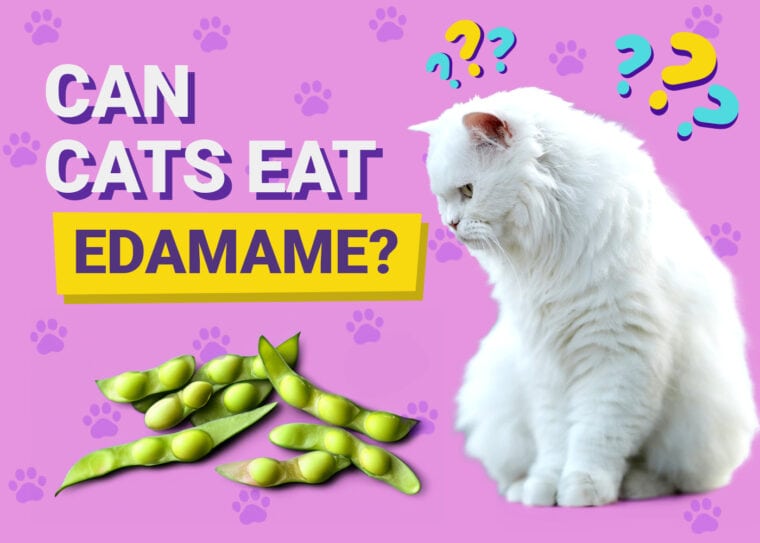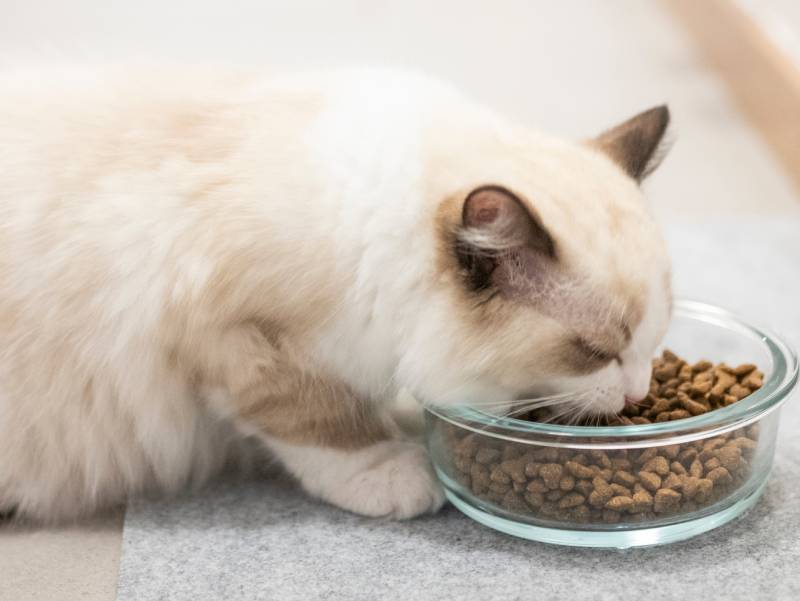
Edamame is a Japanese dish consisting of immature soybeans still in the pod. It can be boiled or steamed and is most often served with salt or other condiments. This popular snack offers a decent source of soy protein, fiber, and antioxidants, but can you share it with your feline family members?
Edamame is non-toxic for cats, but it’s not the best human food you can offer. The health benefits humans reap from this snack do not translate the same for cats. Read on to learn more.
What Is the Ideal Diet for a Cat?
Cats are obligate carnivores with gastrointestinal tracts and a metabolism adapted to a diet primarily consisting of meat. Cats don’t digest plant material well and require the essential nutrients that only meat can provide.
Dogs are omnivores, meaning they can eat plant and animal material without problems. Cats, however, have developed a significantly shorter intestinal tract over time because the foods their bodies are meant to eat do not contain much fiber, making them easy and fast to digest.
In addition, a cat’s pancreas creates less of the enzyme amylase than a dog’s pancreas. Amylase breaks down dietary starches from plants. While cats can have some starch in their diet, too much can cause gastrointestinal upset.

Why Shouldn’t Cats Eat Edamame?
Poor Protein Source
While edamame provides a decent source of protein that you now know cats need to thrive, they require a certain type of protein that comes only from animal meat.
Anti-Nutrients
Edamame contains plant chemicals known as anti-nutrients that can prevent the body from absorbing certain vitamins and minerals. These chemicals may bind or inactivate certain minerals your cat requires, such as taurine.
Taurine is an essential amino acid that cats require in relatively large amounts. They cannot make taurine themselves, so your pet’s diet must contain it for your kitty to get what he needs to thrive. Cats deficient in taurine may develop conditions like feline taurine retinopathy or dilated cardiomyopathy. Thankfully, commercialized cat foods are formulated to give your pet the taurine necessary for optimal health.

What If My Cat Ate Some Edamame?
Edamame is non-toxic, so eating edamame will not poison your cat. However, he may experience some gastrointestinal issues like vomiting due to introducing a new food in his diet. If you notice any new or worrisome signs of illness in your pet after he eats edamame, we recommend contacting your veterinarian for advice.
What If My Cat Likes Edamame?
If your cat loves edamame, you can give him a taste now and then. Treat it as you would any other treat in your pet’s diet. Edamame and the other special treats you provide should make up no more than 10% of your cat’s diet.
If you offer edamame, only give it to your cat if it’s cooked plain, without any seasonings or spices added. Frying isn’t the preferred cooking method as its high-fat content required for frying will outweigh the nutritional benefits your cat would derive from it.
We’ve all been there. You’re eating a delicious meal you’ve prepared, and your kitty is giving you his sweetest puppy-dog eyes at the dinner table, begging for a taste. While you can sneak him an edamame bean, provided it isn’t sauced or spiced, plenty of more appropriate cat-friendly foods can be offered from your plate.
Knowing exactly what your feline companion can and cannot eat will help you become the best pet parent. Recognizing that not all cat bowls are equal is also key! The Hepper NomNom Cat Bowl sets itself apart from traditional options by catering to the specific needs of cats. The innovative design offers whisker relief via shallow dishes and promotes digestion with a slight bowl elevation. Find out if the Hepper NomNom is right for your cat by clicking here.
At Pet Keen, we’ve admired Hepper for many years and decided to take a controlling ownership interest so that we could benefit from the outstanding designs of this cool cat company!
Final Thoughts
While edamame is a healthy food with many benefits for humans, those benefits don’t translate the same for your cat. Edamame doesn’t provide the right type of protein your kitty needs, and its chemical compounds may even prevent your pet from getting all the taurine required to thrive.
While cats may derive some benefit from the nutritional content of edamame, there are better ways to ensure your cat’s dietary needs are being met.
See Also:
- Can Cats Eat Oats? Vet Approved Nutrition Facts
- Can Cats Eat Whipped Cream? Vet Approved Nutrition Facts & FAQ
Featured Image Credit: Koarakko, Shutterstock








